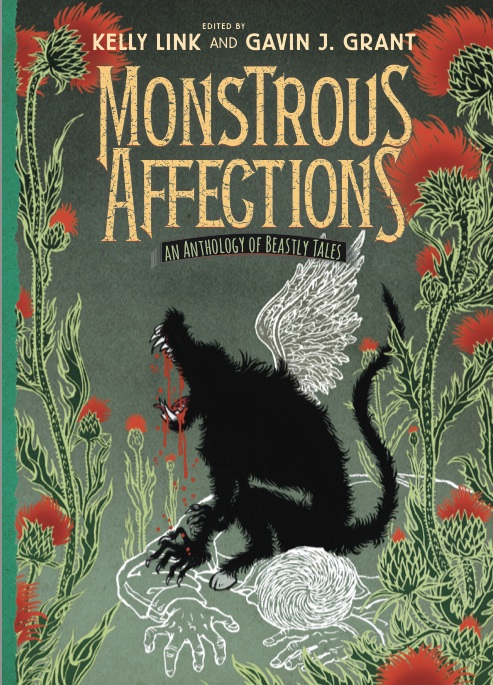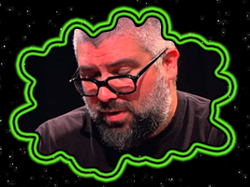Welcome back to The Pop Quiz at the End of the Universe, a recurring series here on Tor.com featuring some of our favorite science fiction and fantasy authors, artists, and others!
Today we’re joined by G. Carl Purcell, a science fiction writer whose work has appeared in magazines including New Genre, Open City, and The 2nd Hand. He was a frequent contributor to McSweeney’s website in its early days, and his work there has been anthologized in Created in Darkness By Troubled Americans: The Best of McSweeney’s Humor Category. He is also a co-creator of the No Slander blog.
![]() Greg’s story “The Mercurials” will be published in Monstrous Affections, an anthology edited by Kelly Link and Gavin J. Grant, available September 9th from Candlewick Press. Get a better look at Yuko Shimizu’s cover art for the anthology as well as the full table of contents here on Tor.com.
Greg’s story “The Mercurials” will be published in Monstrous Affections, an anthology edited by Kelly Link and Gavin J. Grant, available September 9th from Candlewick Press. Get a better look at Yuko Shimizu’s cover art for the anthology as well as the full table of contents here on Tor.com.
What is your favorite short story?
It’s hard to pick just one Robert Sheckley story, but I’m going to go with the classic “Hands Off!”, in which a friendly prospector meets a dangerous crew of stranded pirates on an uncharted planet. Sheckley has a masterful way of pacing the story, cluing the reader in to the fact that the friendly prospector is something very much to the west of human, and no less sympathetic for it.
If you could choose your own personal theme music/song to play every time you enter a room, what would you pick?
As a Doom/Sludge Metal fan from youth, I’d take just about anything from Black Sabbath’s “Masters of Reality,” preferably “Into the Void.” Actually, my initial idea in writing “The Mercurials” was to establish a back story for the lively metamorphic chrome that populated the album covers of my adolescence. For reference, please see Judas Priest’s Painkiller album, or the typography employed by any Black Metal Band.
What literary or film science fiction technology do you wish existed in our world right now?
There’s a beautiful moment in Iain M. Banks’ The Player of Games when one character has to stop and explain to another that the primitive planet they’re about to go observe features something called a “dominant gender,” and then goes on to explain why anyone one group on a planet would find it necessary to own projectile weaponry to protect itself from the another group; the answer is, simply, that they haven’t yet discovered collectivist anarchism as practiced by the Culture. Then again, at this point, I would settle for any nominally democratic political system that didn’t start with an “O” and end with a “ligarchy.”
If you, as a ghost, could regularly haunt one celebrity, author, or literary figure, who would it be?
I once had a dream in which Wallace Stevens haunted me in the form of a Marvel Comic. He was a regularly featured player in the Marvel Universe, occupying his role in relation to poetry much as Doctor Strange occupied his role in relation to the occult. Stevens rode a Roman Chariot led by two enormous White Stags. His archnemesis was a bodiless entity called The Actual, who lived inside of public statuary. I woke up convinced it was a real comic, and that he had appeared, along with the rest of the Marvel Universe, in Dazzler #2. Real or not, it’s the job of better writers than us to haunt us, not vice versa.
 If an alien species visited Earth, do you think they would consider us monsters? Why or why not?
If an alien species visited Earth, do you think they would consider us monsters? Why or why not?
We have a terrible track record when it comes to recognizing consciousnesses other than human. Were the singularity to come, I think that our reaction to the new machine intelligence won’t be to stumble backwards in gobsmacked awe, but to instantly relate it to some genus identifiably “lesser” than us. “Bummer. My PC just floated up into space and started swimming around like some kind of narwhal. Stupid computer can’t even do Quickbooks anymore.” I think a truly alien species would bear the same fate unless it did something really human, like try to enslave John Travolta, or something.
What makes a monster monstrous in the first place?
In the case of the Loch Ness monster or Dracula, it’s the shape. Simply the humanoid form. In other cases, it’s humanoid hunger, as in that oil slick that ate teenagers in Creepshow 2, or anger, as in Grendel’s mom. Know what’s not monstrous? All of Outer Space. A lake, canyon. Most Sublime subjects. They have no human quality. So, in regards to Lovecraft’s cosmic relationship to horror, it’s the thought that something with fingers or an eye would be mothered and fathered by the Sublime that makes it monstrous, not the Sublime itself. In short, monsters is us.










